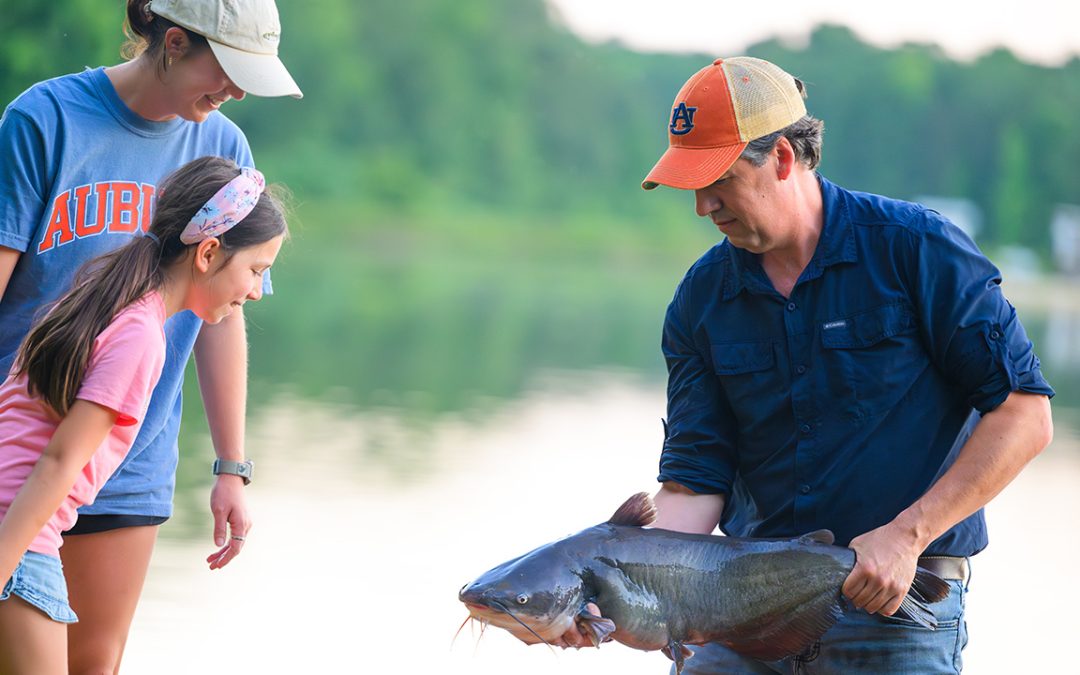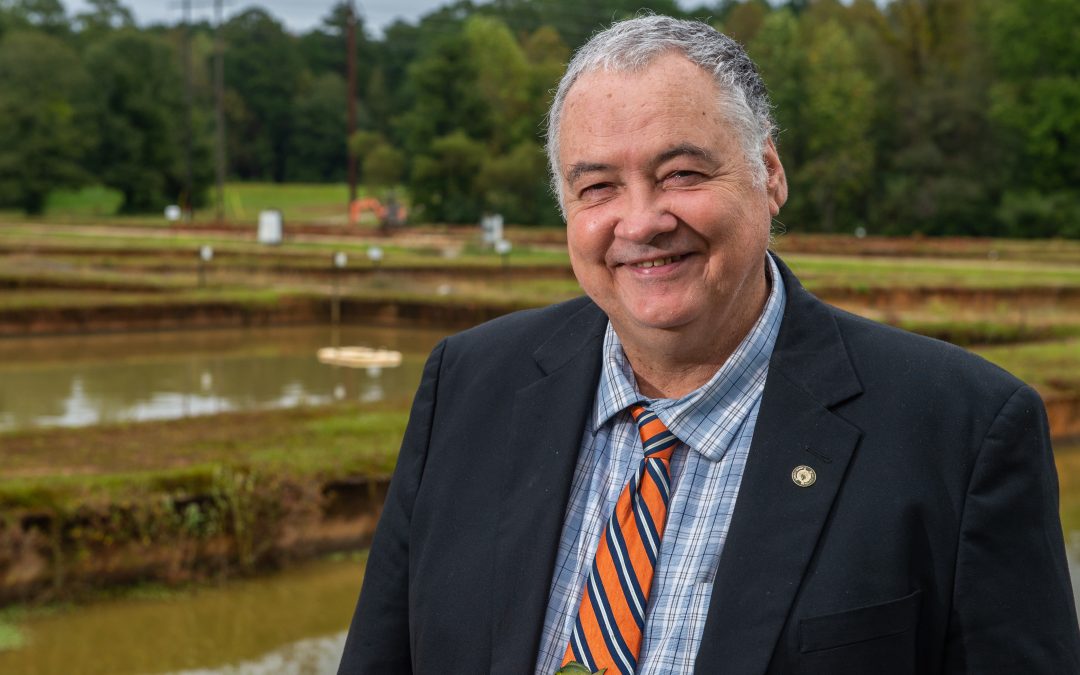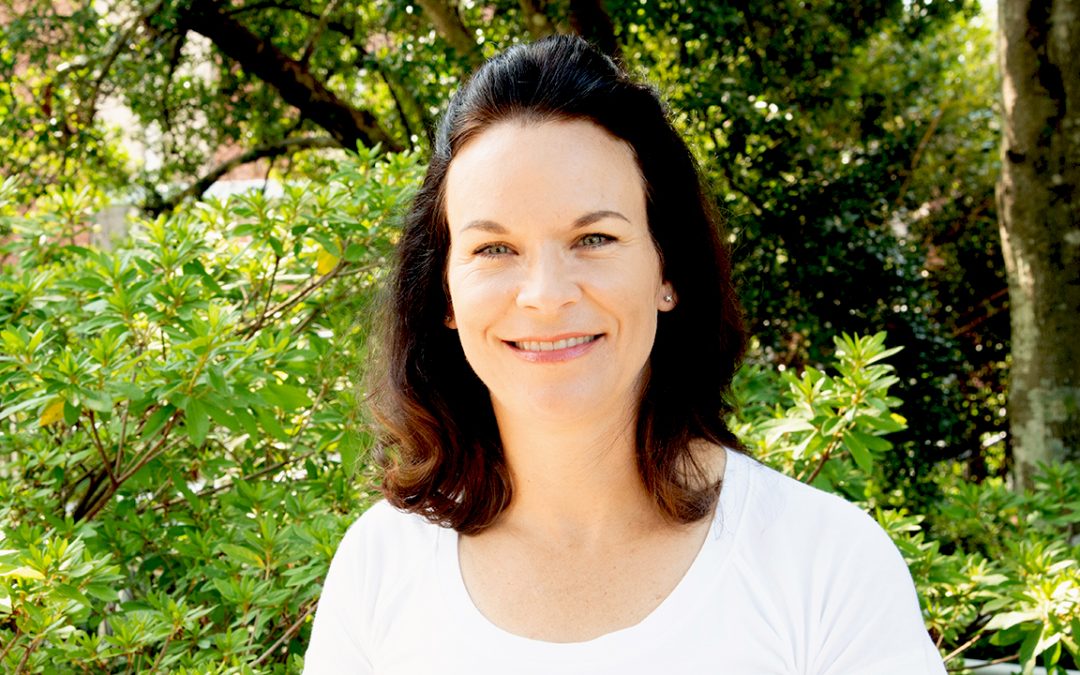
A rock slide triggered by a 7.8-magnitude earthquake blocks a crude mountain road in Nepal April 25. Dave Cline in Auburn’s School of Fisheries, Aquaculture and Aquatic Sciences took the photo and then went to work helping clear the debris.
By Jamie Creamer
It was lunchtime in Nepal, and for that, David Rouse is most thankful. He tries not to dwell on the what-ifs.
Because what if he, fellow Auburn University fisheries expert Dave Cline and their companions had not stopped for a lunch break at the small outdoor eatery when they did. What if, instead, they still had been traveling along the narrow mountain road in Nepal at 11:42 a.m. April 25, as the earth began to shudder with the relentless fury of a deadly, 7.8-magnitude earthquake.
“During the quake, the sensation was like being in a very small boat in rough seas, with waves coming from several directions at once,” says Rouse, director emeritus of Auburn’s School of Fisheries, Aquaculture and Aquatic Sciences. “But it was when we started back on the road and came upon massive boulders and rock slides on the road that I realized that if we had been at any of those locations during the actual quake instead of at the wide spot on the road where the restaurant sat, we could have easily been crushed.”
Rouse and Cline, an extension aquaculture specialist at Auburn, had arrived in Nepal 10 days earlier on a 16-day mission as volunteer aquaculture professionals with the Farmer-to-Farmer Program of Winrock International. Winrock is a Little Rock–based nonprofit that links Americans who have expertise in such areas as agriculture, natural resource management and clean energy with individuals and communities in developing countries in an effort to build human capacity and increase economic opportunities in those nations.
The two Auburn aquaculturists were in Nepal to work with faculty at the country’s Agriculture and Forestry University in developing and evaluating an aquaculture curriculum for students there. The university, which opened in 2010, is located near the Nepal–India border in Rampur, a city in Nepal’s Chitwan District.
On that last Saturday in April, Rouse and Cline—along with Rouse’s wife, Cynthia, as well as an aquaculturist from the Nepalese university and two Winrock employees who were serving as guide and driver—had traveled some distance from the university to visit fisheries facilities. On the return trip to Rampur, they pulled off the road for lunch and were sitting at their table in the when the rumbling and tremors began.
“There was a big bus driving by, and for a second, we thought it was the bus making all the noise, but then I realized what was happening,” says Cline, who had experienced a couple of smaller quakes years ago in California.
“It was all kind of strange,” Cline says. “Windows were rattling, buildings were swaying back and forth and up and down, and nobody was saying anything, and then somebody yelled out, ‘Earthquake!’ and everybody started running and screaming.
“I was thinking, wait, where’s everybody going? There’s nowhere you can run to get away from an earthquake.”
But the April quake was the first in 81 years in Nepal, a nation often described, not as a developing country, but as frontier.
““Where we were, in the mountains, most of the people didn’t have indoor plumbing or electricity, and they probably weren’t alive when the last earthquake hit, so I believe a lot of them really had no idea what was happening,” Cline says. “They didn’t know there even was such a thing as an earthquake.”
When the tremors ended, Cline’s group cautiously resumed travel back to Rampur, some 40 to 50 miles away.
“We saw some serious damage as we were driving,” Cline says. “Some of the houses were nothing but rubble, especially those built of stones and mud. Those people had lost what little they had had.”
The remaining miles were a slow go, with frequent stops due to boulders and debris in the crude road.
“We hadn’t been driving long when we had to stop because a rock slide was blocking the road, and there was a crowd of people standing there staring at it, nobody making a move to clear it,” Cline says. “I think they were in shock.”
Cline, Rouse and companions went to work moving the rocks, and that brought the locals around. An hour later, with the help of a tractor that had made it through the quake, they had made the road passable. Though rocks continued to fall from the mountains and into the road, the group at last arrived in Rampur, where damage from the quake was minimal.
“The sharp curves and steep grades on those mountain roads make it slow driving anyway, but when you add a bunch of rock and boulders, it took us four or five hours, at least, to get back,” Rouse says. “We were very relieved to get out of the mountains safely and back to the university where we were working.”
Although the Auburn travelers did return home ahead of schedule, it was only by a day. That was by design, Cline says.
“We had gone there to try to make a difference in their lives, and since the Winrock people were taking great care of us, we felt it was important to accomplish what we’d gone there to do before we left,” he says.
Leaving the devastated country behind was difficult emotionally, and Cline and Rouse say they left a part of themselves there.
“The people of Nepal are some of the nicest people I’ve ever worked with,” says Rouse, who traveled to many countries while in Auburn fisheries. “This was a very poor country before the quake. Rebuilding will take many years and much help from nations around the world. My heart aches for the Nepalese who have lost so much.”




